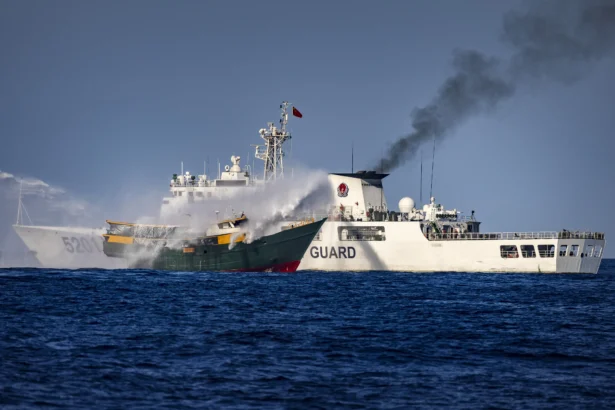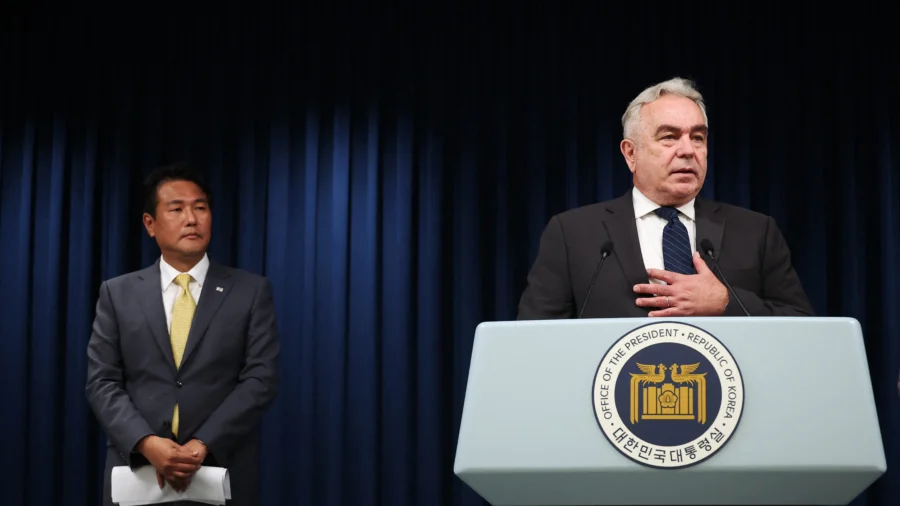U.S. Deputy Secretary of State Kurt Campbell expressed “serious concerns” over the Chinese regime’s “destabilizing actions” in the South China Sea during a phone call with his Chinese counterpart on Thursday, the State Department said.
Mr. Campbell’s phone conversation with China’s vice premier of foreign affairs, Ma Zhaoxu, is the latest in a series of interactions Washington said aimed at responsibly managing competition between the two rival powers.
The United States and communist China remain at odds on almost every front, ranging from trade to technology, human rights conditions in the mainland, and Hong Kong, to Beijing’s role in aiding Moscow’s war against Ukraine and the regime’s military aggression in the South China Sea.
According to the U.S. State Department, Mr. Campbell’s conversation with Mr. Ma covered both areas of difference and potential cooperation.
Mr. Campbell “raised serious concerns regarding the PRC’s destabilizing actions in the South China Sea, including at Second Thomas Shoal, and affirmed the United States’ support for freedom of navigation and overflight and the peaceful resolution of disputes, consistent with international law,” State Department spokesperson Matthew Miller said in a statement on June 27, using the acronym of China’s official name under the Chinese Communist Party (CCP), the People’s Republic of China.
Mr. Campbell, who until recently served as President Joe Biden’s Indo-Pacific policy czar, told Mr. Ma that the U.S. commitments to the Philippines under the Mutual Defense Treaty remain “ironclad,” according to Mr. Miller.
Mr. Campbell also stressed the “importance of maintaining peace and stability across the Taiwan Strait,” where the Chinese military has recently staged large-scale military exercises that Beijing said were designed to test its ability to “seize power” over self-ruled Taiwan.
Regarding the war in Ukraine, Mr. Miller said Mr. Campbell “reiterated concern” over the Chinese regime’s support for the Russian defense industrial base. The two senior officials also discussed challenges on the Korean Peninsula, he said.
The Chinese regime appeared to be unmoved by Washington’s appeal.
At a regular briefing on June 28, China’s foreign ministry spokesperson Mao Ning told reporters that Mr. Ma and Mr. Campbell had a “frank and in-depth” conversation, during which the Chinese side highlighted its stance on issues related to Taiwan, Tibet, Ukraine, and the South China Sea.
Mr. Ma blamed the Philippines for the rising tensions in the South China Sea and called on the U.S. side to stop supporting what China called the Philippines’ “provocations and nuisance,” according to Ms. Mao.
The CCP laid sovereignty claims to almost the entire South China Sea, a waterway crucial to global trade.
Its neighbors—namely, the Philippines, Vietnam, Malaysia, Taiwan, and Brunei—also overlapped claims in the important waterway.

The latest U.S.-China engagement comes as tensions in the South China Sea simmer after multiple confrontations between ships from China and the Philippines in the vital waterway in recent months.
In a June 17 encounter, the Philippines said its personnel were injured, and vessels were damaged after a clash between boats from Manila and Beijing near Second Thomas Shoal, part of the disputed Spratly Islands in the South China Sea.
China’s defense ministry said the Philippine side “deliberately and dangerously” approached its naval ships, causing the collision. The Philippines’ foreign ministry blamed the Chinese authorities’ “illegal and aggressive actions” for the accident.
A 2016 international ruling rejected the CCP’s claim of waters near Second Second Thomas Shoal, saying the island was within the Philippines’ exclusive economic zone. The CCP, however, dismissed the ruling by the U.N.-affiliated court in the Hauge and refused to participate in the arbitration.
In the face of CCP’s military expansion, the Philippines and the United States have agreed to increase military coordination. In February 2023, the two countries signed an agreement that expanded the U.S. military presence in the Philippines by providing access to four more Philippine military bases.
On June 27, President Biden’s national security adviser, Jake Sullivan, had a phone call with his Philippine counterpart, Eduardo M. Año, during which he also reiterated the “ironclad” U.S. commitments to the Southeast Asian country.
From The Epoch Times

